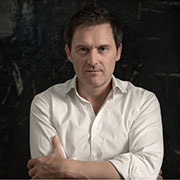Mahler’s symphonies are “musical travelling companions” for him. Now Andrea Lorenzo Scartazzini has composed introductory pieces to the monumental works of Mahler for the Jena Philharmonic.
The Swiss composer Andrea Lorenzo Scartazzini is to work with the Jena Philharmonic over several years as composer-in-residence. He is engaged on a multi-part work with references to the Mahler symphony cycle which Simon Gaudenz and the Jena Philharmonic will perform over the coming years. For each Mahler symphony there will be a symphonic movement by Scartazzini, and with each Mahler performance these new symphonic movements will join together to form a large-scale orchestral work.
“Torso” is the title of the first part, to be premiered on 18 October 2018. It introduces the complete cycle. The orchestral piece uses the two distant trumpets at the beginning which play such an important role in Mahler’s work. In “Torso” they are the “bringers of the music, the two instruments ignite the orchestra, so to speak, they bring it to life”, the composer says. The evocative title alludes to this process of awakening: it draws on Rainer Maria Rilke’s sonnet “Archaischer Torso Apollos”. In this the poet describes an incandescence, a mysterious life which the sculpture of the god possesses: “In the text Rilke reverses the observer’s situation. This youth’s torso has its own life, it begins to glow and glisten. When you look at him, he looks back. An analogous interaction exists between the ‘pair of eyes’ of the two distant trumpets and the gradually awakening sound ‘body’ of the orchestra. At first only the high and low ranges sound forth, then a broader string sound develops, a slow breathing and pulsing centre into which woodwind lines are drawn like bloodstreams. After an intensification the piece finally leads into a broad octave sound, a kind of dominant to the beginning of Mahler’s Symphony no. 1.”
The composer is structuring his complete cycle so that an inner dramaturgy develops between sections, whereby the first two will later form a larger movement – ”Torso” initiates a “work in progress” which will result in a larger form. There is only indirect reference to Mahler, not a quotation. For Scartazzini Mahler’s symphonies have been “musical travelling companions for many years. Every time I hear them again I am gripped by the sheer wealth of inspiration and emotion. I am not going to slave away on this cosmos, I am not going to quote or comment on anything, why should I! But I will react with pleasure to my illustrious neighbour, and distance myself or approach in the sense of an over-arching dramaturgy. And so both should succeed: to create my own work and yet to build a bridge.”
Marie Luise Maintz
(from [[t]akte 2/2018)



